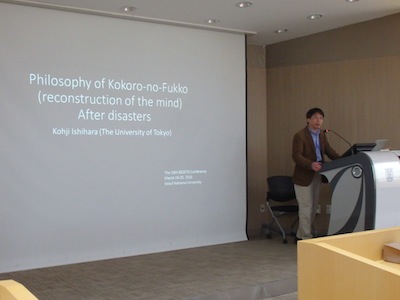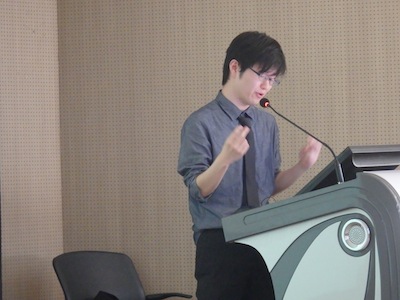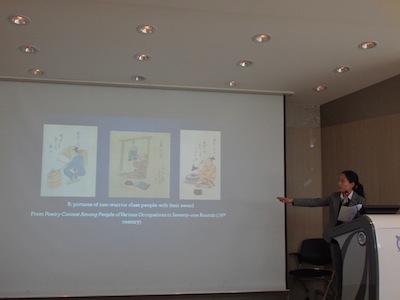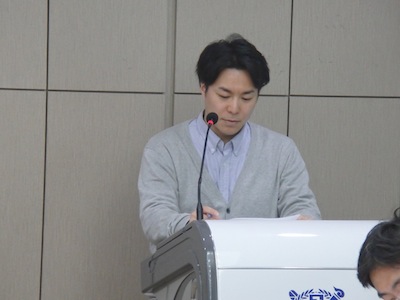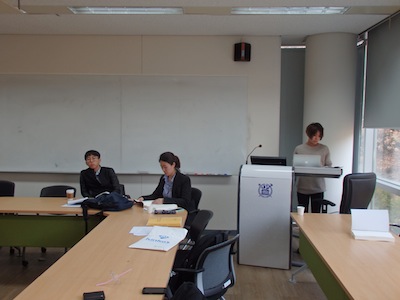[Report]10th BESETO Conference
On 19th and 20th March 2016, the 10th BESETO Conference was held in Seoul National University. The BESETO conference are organized by University of Pekin, Seoul National University and, the University of Tokyo, and has annually been hosted by each university. In this year, from UTCP, five participants gave the presentations on their philosophical research.
Kohji Ishihara (UTCP) “Kokoro-no-fukko” (Reconstruction of the Mind) after Disasters
and the Embodied Mind Approach
After the Great Hanshin-Awaji Earthquake, the term “Kokoro no Fukko” (Reconstruction of the Mind) spread widely. Although there seems to be no univocal definition or agreement concerning its meaning, we found two possible alternative meanings. First, it could refer to recovery from the damage inflicted on the mind by the disaster. Second, it could refer to the restoration of the everyday life through reconstruction of the social network. The embodied mind approach seems to bridge the gap between these objectives. Some approaches of phenomenological psychopathology can be regarded as versions of the embodied mind approach. Drawing on Kitaro Nishida’s concept of “intuitive action,” Bin Kimura characterized depersonalization as the loss of the extension of “now” or “here” which makes possible the self, others, space, and reality. Such a perspective not only bridges the two objectives of the recovery of the mind, but also suggests that reconstruction of the space of everyday life cannot be separated from the reconstruction of the mind.
Kentaro Ide (PhD student, University of Tokyo) “Pursing the Origin――Hermeneutics and Poetics from East Asian Intellectual Tradition”
My presentation, which was entitled “Pursing the Origin――Hermeneutics and Poetics from East Asian Intellectual Tradition,” discussed two thinkers in early modern Japan, Ogyū Sorai and Moto’ori Norinaga, especially analyzing their method of considering language to be a vehicle to transmit the “Way” in historical time. Questioning how Moto’ori criticized Ogyū’s method to bring the authority of Chinese Sage-Kings to legitimatize the act of creating the “Way” as language, I attempted to elucidate Moto’ori’s strategy to articulate the historical expression of Japan. In doing so, I argued that he deconstructed the self-same “origin” of language, thereby unfolding the transformative process of no-origin, which he called “rhetorical figures” (文wen). I then concluded Moto’ori intended to identify this limitless process with the historicity of Japan to be praised. Through arguments above, my presentation endeavored to trace Moto’ori’s theorizing of “Japan” to its source and to fundamentally criticize it. Finally, I would like to express my heartfelt gratitude toward everyone in SNU without whose hospitality we could not have such fulfilled conference, every participants, and Kawamura-sensei who guided us meticulously.
Cosmo Usami (PhD student, University of Tokyo) Japanese Swords and the Influence of Modern Subjectivity on Premodern Historical Narratives
To think philosophically is helpful not only for those who major in philosophy but for those who major in other disciplines. While I was preparing my presentation for the BESETO and the round-table session, I realized the unlimited aspects of history. Society and people recognize an aspect as the “truth” or “common ideas” even if there are not enough historical evidences. This is what I have mentioned in the conference. Think philosophically, in other words, critically and logically, will help all of us to blush up ideas and will be a hint for a new viewpoint. I would say this kind of discussion will be enlightenment for the transition of the viewpoint, which would produce new knowledge. And it is I that got enlightened by this conference.
In addition, during the 10th BESETO conference I had a very valuable experience. Especially I enjoyed the round table session in which we discussed “Philosophy and Public”, because the relationship in Japan between academy (human science) and public has been discussed seriously, and academy has to show how useful they are for public. I have felt that unlike history, which study about some specific topics, the way to think philosophically, in other words, critically and logically, will help everyone to blush up their ideas and will be a hint to gain a new viewpoint, which I think can be a bridge between academy and public, one major and another.
Takafumi Shimada (PhD student, University of Tokyo) “Difference of Force”
In the conference, I delivered a speech to reveal a common theme that four philosophers—Kant, Nietzsche, Deleuze and Derrida—share in their thoughts: “difference of force. ”At the beginning, I started with Deleuze’s passage on the “will to power” in Nietzsche’s thought, which Derrida also quotes in his work. Both Deleuze and Derrida attach great importance to difference of force in this Nietzsche’s motif and elaborate their respective concepts, that is, différentiation of the former and différance of the latter, from their reading of Nietzsche. Afterwards, I demonstrated how they reinterpret Kant’s doctrines of faculties from the viewpoint of difference of force. The doctrines of faculties are constructed by his architectonic, where an operation of each faculty is limited in its domain. Certainly, this architectonic can be considered as a certain kind of difference of force. However, after all, the faculties are unified in an accord, as illustrated by “common-sense.” Deleuze counters it with his own notion “para-sense,” which determines the communication between “disjointed faculties.” On the other hand, Derrida develops the notion of difference of force into that of exchange of forces, of possibility and impossibility. Since Kant’s architectonic gives the condition of possible experience, this exchange of possibility and impossibility undermines the architectonic. Through these arguments, I proved that these four philosophers share the theme of difference of force in common. Many questions were raised by some of the audience which helped develop our arguments.
Makiko Iseri (UTCP/PhD student, University of Tokyo) Prosthetics, Superhumans, and the Politics of Bodily Flexibility
In the realm of both queer theory and critical disability studies, ‘anomalous’ or ‘extraordinary’ bodies have played a significant role in the politics of (bodily) boundaries as the place where coherence of the social unity is both delineated and threatened. In these fields, bodily flexibility has often been celebrated for its potential to destabilise the boundaries and to expose their transformability into the alternatives. Within the context of today’s neoliberal social order, however, bodily flexibility also signifies a desirable ‘capacity’ by which some bodies (all too often, heterosexual and abled bodies) can profit, while working to require certain other bodies (namely, queer and disabled bodies) to flexibly comply for making the former’s success possible. Drawing on these arguments, this paper shall attempt to show how queer theory and disability studies are confronted with the similar problem in relation to bodily flexibility and neoliberalism. By examining cultural representations of prosthetic bodies as boundary-crossing ‘superhumans’, with focuses on body representation of Aimee Mullins and that in Mad Max: Fury Road (2015), this paper aims to offer a critical analysis of the current situation surrounding ‘diversity policies’ in Tokyo where 2020 Olympic and Paralympic are scheduled to take place.







